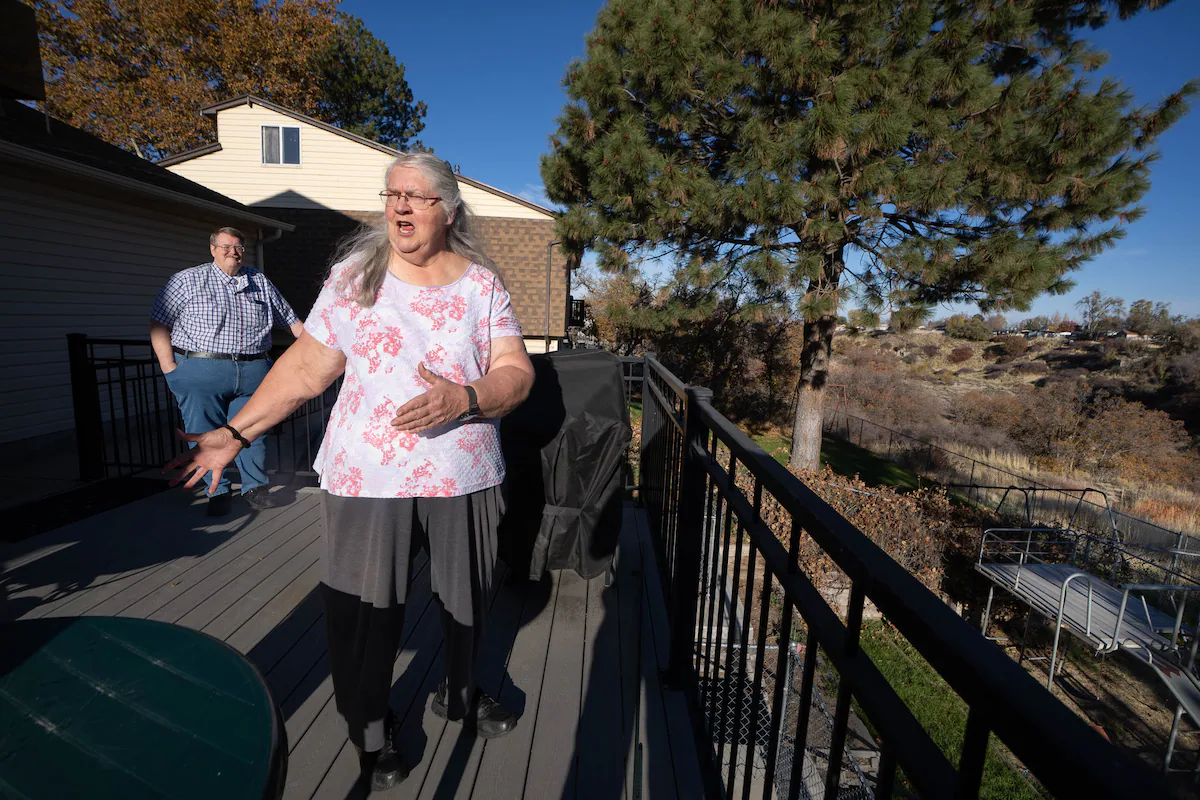Copyright Salt Lake Tribune

White City • Renee and Lamont Christensen’s home has reliably provided for their family in so many ways over the decades. Its walls sheltered the couple and their eight growing children. Its backyard, an entryway to the Dimple Dell gully, gave their kids a natural playground, from which Renee would summon them in for the evening with the chime of a classic metal triangle. The home later withstood an upstairs addition when space got too tight. And when the kids moved out, boarders rented their rooms, which helped the Christensens pay their bills. Whenever a relative needed a place to stay, the house was there for them, too. These days, Renee said, quarters remain close — and finances tighter than they’ve ever been. Her son, William, ran into financial troubles and moved in with his wife and kids this spring. Before that, another son had been living there, plus three renters. They’re not alone. A growing number of families — both nationally and in Utah — live together to save money amid high housing costs, inflation and a weakening labor market that’s stuck, as The New York Times reported, in a “‘low-hire, low-fire’ limbo.” And fewer adults between the ages of 25 and 34 live away from their parents. The Christensen family still rents one room to a boarder, but Renee Christensen, who retired last December after a decades-long career driving school buses, started driving buses again this summer to make ends meet. “It’s been a good life here. The family’s too big. We’re jammed in,” she said, standing on her back porch on a recent sunny Tuesday, “but we’re never going to be able to replace this environment.” William Christensen said that even with his family back in his childhood home, its current eight residents are “not even the most we’ve had living here.” At various times, in addition to William’s parents, five members of his family and his seven siblings, the home has housed his grandparents, an uncle and multiple boarders “in desperate situations,” as Renee Christensen put it. “People are having to make big sacrifices to afford housing, and that’s just because housing is unaffordable to most people,” said Daryl Fairweather, chief economist for the real-estate company Redfin. Even Gov. Spencer Cox’s family is feeling the squeeze. He and first lady Abby Cox were empty nesters after their youngest went to college — but no longer. “I’ll be darned if two months ago, two of our kids didn’t boomerang back into our basement,” Cox said while talking about housing at the 2025 Ivory Prize Summit late last month. A missing milestone About 120 miles south of the Christensens’ home, in Utah’s rugged Sevier Desert, Kasey Olcott lives in his parents’ Delta basement. He shares custody of his four kids, who regularly live there, too. Even though he has a full-time job, works part-time in emergency medical services, has zero loans and doesn’t have high balances on credit cards, he can’t afford to buy or rent in the western Utah city of fewer than 4,000 people. Rents there are inflated right now because of contract work on industrial projects, Olcott noted. He’s been trying to save for a house, he said, and even looked into building a duplex and renting out one side. But he can’t make the down payment. Across the country, home prices have jumped nearly 50% since before the coronavirus pandemic, and fewer and fewer rentals are available for less than $1,000 a month. In 2005, living away from parents was the most commonly experienced milestone, with about 84% of 25-34 year olds living independently, according to a working paper from U.S. Census Bureau researchers. By 2023, that percentage had dipped to 81%. Young adults now are more likely to have completed their education and landed a full-time job than they are to have lived away from their parents. Nationally, 17.7% of adults between the ages of 25 and 34 lived with either one or both parents in 2023, according to a Pew Research Center analysis of estimates from the Census Bureau. In Utah’s metropolitan areas, the portion of 25- to 34-year-olds living with their parents ranged from 8.4% in and around Provo to 16.7% in the St. George area. How they got here The Christensen family is familiar with being frugal. Over the years, in addition to opening up rooms to renters, they have found other ways to provide on a tight budget in tough times. For instance, both Renee and Lamont Christensen have worked various jobs on the side — newspaper driver, apartment manager, store clerk, baker, custodian — to make ends meet. In her living room, she pointed to a line of framed, hand-drawn portraits of her eight children on the wall as another example. “I bartered for the pictures,” she said. “I just happened upon a generous lady who let me make birthday cakes in exchange for her doing the pictures,” she said. At $340 per portrait, and $10-15 per cake — “that’s a lot of cake,” Renee Christensen said. But she did what she had to do for her family, as she’s trying to do now. This time, though, is different. “It’s worse,” said Renee Christensen, who is 66, “because my ability to respond now is less now that I’m older.” From the kitchen table of his childhood home, William Christensen laid out the reasons he and his family needed to move in with his parents. They couldn’t keep up with rent at their apartment, which they surrendered, because his income alone wasn’t enough, and his wife was having trouble finding work. Then, William Christensen lost his job for nearly a month. They had to sell their car. Before he lost his job, he explained, about 90% of his paycheck went to providing the family’s basic resources. When he didn’t have a job, those expenses still came due. His cellphone was cut off because he couldn’t pay the bill. That was an easier expense to lose, he said, since they can still make calls and send texts over Wi-Fi. Then, the engine in the car they bought died. As he waited months for the fixes to be made under warranty, William Christensen said he still had to make payments on the car he couldn’t use and figure out transportation for the family. Things only now seem to be stabilizing. The car is fixed. He and his wife are employed. He hopes that things will feel less dire once a few more paychecks come in. There is still uncertainty. His family relies on the Supplement Nutrition Assistance Program, or SNAP, to buy groceries. This month, the status of those federal benefits has been in limbo amid the government shutdown. Just before William Christensen left for his job after speaking with The Salt Lake Tribune, David Hitchcock arrived home from his. Hitchcock, 50, began renting his room in the Christensens’ house in 2017. He pays $400 a month. As a fellow school bus driver, he makes just over $40,000 a year. His bills, he said, add up to about $4,000 per month, and he only makes about $3,000. He said he couldn’t afford a one-bedroom or studio apartment. Hitchcock ascribed his financial difficulties to impulse buying, adding it’s “embarrassing to admit.” “I collect all kinds of things and buy stuff all the time,” he said. Eventually, he bought so much that he couldn’t afford to pay his bills. “So then I went out and got these high-interest personal loans, and those payments are huge. So then I got farther behind, and I was just kind of barely getting by,” he said. “And then I impulsively bought a new used car.” He realized recently, through the help of the YouTube series “Financial Audit,” that he needs to get his spending under control. At the beginning of the year, he said, he plans to file for bankruptcy and try to start over. “Hopefully,” Hitchcock said, “if my habits have really changed, and I’ve changed as a person, then theoretically, I won’t get into this mess again.” His focus after that? Saving up enough money to buy a mobile home. While Hitchcock knows “things cost a little more,” he said he doesn’t blame the economy for his financial problems. “Because I think the significant part of it that’s messed up,” Hitchcock said, “is how I was handling things.” The cost of raising a family Though moving back in with parents is relatively more common right now, it’s still seen as a large financial sacrifice. People struggling to afford their rent or mortgage are most commonly giving up luxuries like eating out and taking trips — or finding ways to make more money, like adding hours or another job, borrowing money or selling belongings, according to a Redfin survey Fairweather cited. People were less likely to move in with family or friends. Fairweather pointed to some more uncommon sacrifices, as well, like 4.6% of people who said they gave up their pets and 4.4% who stopped contributing to college savings for their kids (or started setting aside less). She said there could be some eased pressure if interest rates on mortgages drop, but Redfin isn’t forecasting that. “Unfortunately,” she added, they also expect rent prices to increase next year. Fairweather recommended that people consider signing a longer lease — like two years instead of one, if possible — to lock in their rent cost. And she said people could explore different cities or neighborhoods for more affordable housing, especially areas accessible by public transit. Olcott said the biggest thing people can do is to keep up hope. “Keep trying. Keep saving,” he said. “There’s got to be an end in sight somewhere.” On the morning she spoke with The Tribune, about an hour after she’d shuttled kids to Waterford School, Renee Christensen climbed back into her shiny, yellow school bus, grabbed an orange clipboard and went through her safety checklist in the empty bus. Even with a dream vacation planned to the South Pacific for the end of this year, she said this isn’t how she thought she’d spend her retirement. But in addition to supporting her kids, she and her husband have had troubles of their own. They had to dip into savings and retirement funds to buy another car this year after theirs broke down. They recently had to liquidate a certificate of deposit early to pay off credit card debt. The costs don’t end. “It has always taken money,” she said later in a text message, “to raise a family.”



